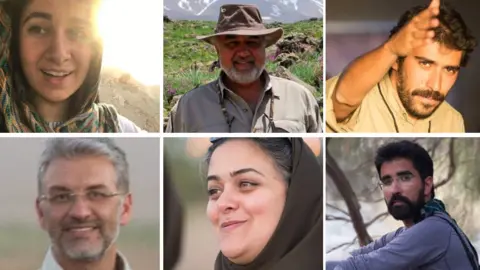Iran 'sentences wildlife activists' accused of spying
 anyhopefornature.net
anyhopefornature.netA court in Iran has sentenced six wildlife conservationists accused of spying to between six and 10 years in prison, their families say.
They were among a group detained in early 2018 while using cameras to track endangered species.
Another conservationist died in custody shortly after his arrest, but the circumstances remain disputed.
Iran's judiciary has not confirmed the sentencing of the group, which includes a man with British and US citizenship.
Relatives of the six - all members of local environmental group Persian Wildlife Heritage Foundation (PWHF) - told BBC Persian that they had been sentenced on Wednesday after some 22 months in custody.
Morad Tahbaz and Niloufar Bayani received 10-year sentences, Taher Ghadirian and Houman Jokar got eight years, and Amirhossein Khaleghi Hamidi and Sepideh Kashani got six years, their relatives said.
Tahbaz is an Iranian national who also holds American and British citizenship.
Details of the final charges or the status of two other members of the group who remain in custody are not yet known.
The conservationists denied the charges, and scientists around the world lobbied to try to secure their release.
How did we get here?
The conservationists were arrested in January 2018 by the intelligence wing of the powerful Islamic Revolution Guards Corps (IRGC).
Authorities accused them of collecting classified information about Iran's strategic areas under the pretext of carrying out environmental and scientific projects.
The wildlife experts had been using cameras to track endangered species, including the Asiatic cheetah and Persian leopard, according to rights group Amnesty International.
Shortly after their arrest, Iran's judiciary said a dual Canadian national among them, Kavous Seyed-Emami, had killed himself because of the evidence against him. His son and others have disputed this version of events.
UN human rights experts said it was "hard to fathom how working to preserve the Iranian flora and fauna can possibly be linked to conducting espionage against Iranian interests", while a government committee concluded that there was no evidence to suggest that the group were spies.
In October 2018, four of the group - believed to be Bayani, Tahbaz, Jokar and Ghadirian - were charged with "sowing corruption on earth", which carries the death penalty. Three others were charged with espionage, and a fourth was accused of "co-operating with a foreign enemy state".
Amnesty International said there was evidence that the conservationists were subjected to torture in order to extract forced "confessions" and called their trial "grossly unfair".
